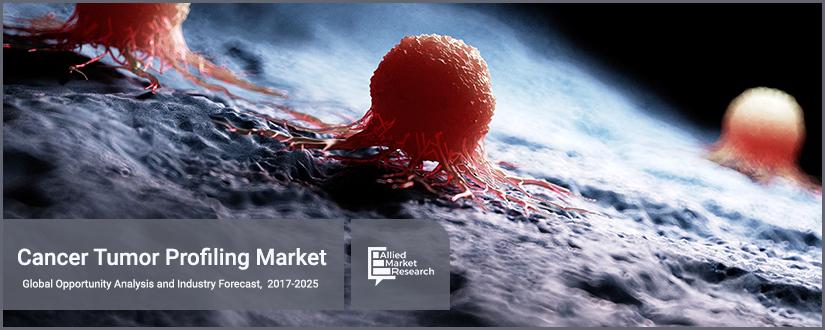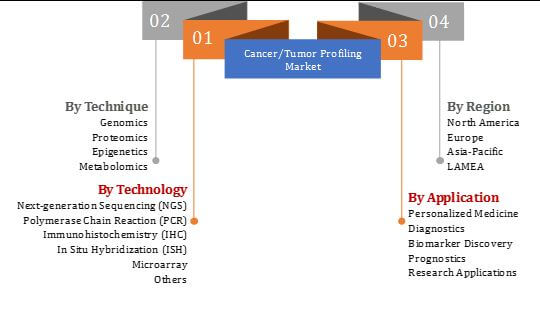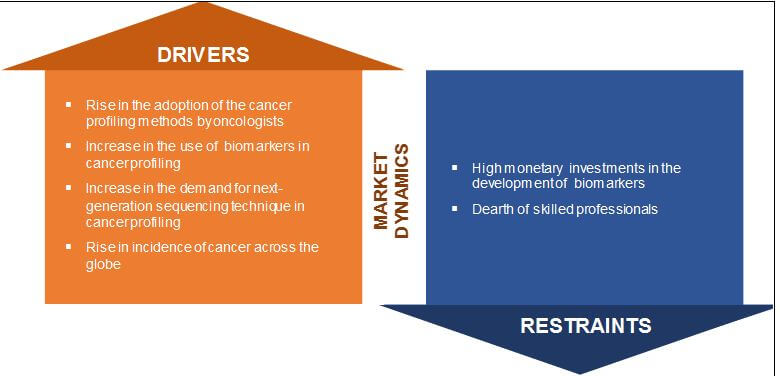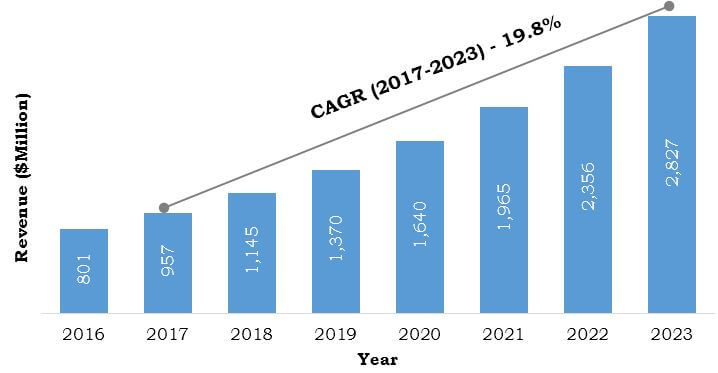Cancer/Tumor Profiling Market
Global Cancer/tumor Profiling Market was valued at $25,318 million in 2016, and is expected to reach $82,447 million by 2023, registering a CAGR of 18.4% from 2017 to 2023. Cancer/tumor profiling provides information about the genes causing cancer, which would offer useful insights related to the mechanism of cancer. The potential of cancer profiling is not only limited to common cancers, such as lymphoma and breast cancer, but also is useful in molecular profiling of lung cancer, prostate cancer, and acute leukemia. Cancer profiling has plays a vital role in diagnosis at the molecular level, as better understanding of the cancer tumors helps physicians to make appropriate therapeutic decisions and avoid “over-treatment” of the cancer patients.
The global market is driven by growing demand for cancer profiling method by oncologists to diagnose or treat cancers as well as predict response to targeted therapy. In addition, rise in adoption of cancer biomarkers for tumor profiling, increase in incidence of cancer across the globe, and growth in use of next-generation sequencing technique for cancer profiling boost the market growth. However, high monetary investments for the development of biomarkers and dearth of skilled professionals or oncologists specific to tumor profiling hamper the market growth.
Global Cancer/Tumor Profiling Market Segmentation
Drivers, Restraints, and Opportunities
The impact of the driving factors is expected to surpass that of restraints. Moreover, increase in focus towards personalized medicine offer lucrative opportunities for the market growth.
Global Cancer/Tumor Profiling Market: Drivers, and Restraints,
Segment Review
The global cancer/tumor profiling market is segmented based on technology, technique, application, and region. Based on technology, it is classified into next-generation sequencing (NGS), polymerase chain reaction (PCR), immunohistochemistry (IHC), in situ hybridization (ISH), microarray, and others. The in-situ hybridization segment is further categorized into fluorescence in situ hybridization (FISH) and chromogenic in situ hybridization (CISH). Based on technique, the market is classified into genomics, proteomics, epigenetics, and metabolomics. Based on application, it is divided into personalized medicine, diagnostics, biomarker discovery, prognostics, and research applications. The cancer/tumor profiling market is analyzed across four regions namely, North America, Europe, Asia-Pacific, and LAMEA.
China Cancer/Tumor Profiling Market, 2016-2023 ($Million)
China offers lucrative opportunities for the market growth, owing to significant development of precision medicine in the region. In addition, advanced cancer testing in this country is associated with its research prowess in genome sequencing and large patient base in urban areas.
The report provides a comprehensive analysis of the key players operating in the global market, which include Qiagen N.V., Roche Molecular Systems Inc., Abott Molecular, Illumina Inc., NeoGenomics Laboratories, HTG Molecular Diagnostic, Genomic Health Inc., Hologic Gen-Probe, BD Biosciences, and Siemens Healthineers.
The other key players in the value chain include Claris Life Sciences, Personal Genome Diagnostics, Inc., Perthera, Inc., Foundation Medicine, Inc. V., Strand, ApoCell, Contextual Genomics, Agendia, and GenScript.
Key Benefits
- The study provides an in-depth analysis along with the current trends and future estimations of the global cancer/tumor profiling market to elucidate the imminent investment pockets.
- Comprehensive analyses of the factors that drive and restrict the market growth are provided in the report.
- The quantitative analysis of the industry for the period of 2016 to 2023 is provided to enable stakeholders to capitalize on the prevailing market opportunities.
- Extensive analysis of key segments of the industry is provided to understand the type of techniques and methods used across the globe.
- Key market players and their strategies are analyzed to understand the competitive outlook of the market.
Cancer/Tumor Profiling Market Key Segments:
By Technology
- Next-generation Sequencing (NGS)
- Polymerase Chain Reaction (PCR)
- Immunohistochemistry (IHC)
- In Situ Hybridization (ISH)
- Fluorescence In Situ Hybridization (FISH)
- Chromogenic In Situ Hybridization (CISH)
- Microarray
- Others
By Technique
- Genomics
- Proteomics
- Epigenetics
- Metabolomics
By Application
- Personalized Medicine
- Diagnostics
- Biomarker Discovery
- Prognostics
- Research Applications
By Region
- North America
- U.S.
- Canada
- Mexico
- Europe
- UK
- France
- Germany
- Italy
- Spain
- Rest of Europe
- Asia-Pacific
- Japan
- China
- India
- Australia
- Rest of Asia-Pacific
- LAMEA
- Brazil
- Turkey
- Argentina
- South Africa
- Rest of LAMEA
Cancer Tumor Profiling Market Report Highlights
| Aspects | Details |
| By TECHNOLOGY |
|
| By TECHNIQUE |
|
| By APPLICATION |
|
| By GEOGRAPHY |
|
| Key Market Players | ABBOTT LABORATORIES, GENOMIC HEALTH INC., HTG MOLECULAR DIAGNOSTIC, SIEMENS HEALTHINEERS, QIAGEN N.V., NEOGENOMICS LABORATORIES, BD BIOSCIENCES (BECKTON DICKINSON), ILLUMINA INC., HOLOGIC GEN-PROBE, ROCHE MOLECULAR SYSTEMS INC. |
Analyst Review
Cancer/tumor profiling enables extensive analysis of tumor and study of the genetic characteristics. It has gained importance over the years, as cancer profiling methodologies provide useful information related to cancer tumor. The information obtained through cancer profiling is utilized in designing an appropriate therapeutic treatment for any individual suffering from cancer. Rise in incidence of cancer across the globe has fueled the demand for molecular profiling techniques for cancer identification. In addition, increase in awareness related to different types of cancers, such as breast cancer, oral, and pancreatic, among others supplement the market growth. Oncologists use cancer profiling methods to differentiate between cancer cells at the molecular level.
Cancer profiling is performed through various methods such as, next-generation sequencing (NGS), polymerase chain reaction (PCR), in situ Hybridization (ISH), immunohistochemistry (IHC), microarray, and others. The next-generation sequencing (NGS) segment has a major share in the global market, and oncologists showcase high adoption of NGS technologies for cancer profiling. NGS enables a deep sequencing of tumor biopsies, fine needle aspirations (FNAs), or circulating tumor cells (CTCs). This enables a detailed profiling of cancer through the identification of mutations, thereby boosting the demand for NGS. However, fluorescence in situ hybridization has gained traction in the recent years due to higher sensitivity than NGS. The personalized medicine segment is anticipated to drive the global market, and the routine use of customized profiling panels including FISH as well as NGS is set to increase in near future.
The techniques involved in cancer profiling include genomics, proteomics, epigenetics, and metabolomics. Proteomics is the second most popular technique used in the cancer profiling market, as the quantitative assessment of protein levels in malignant tumors through proteomics profiling techniques plays a major role in comprehensive understanding of cancer. This protein quantitative assessment is crucial to ensure accurate diagnosis as well as to provide therapy to the cancer patients. Rise in incidence of breast cancers across the globe and increase in focus towards targeted therapy for cancer patients are expected to boost the market growth in the near future.
Loading Table Of Content...







